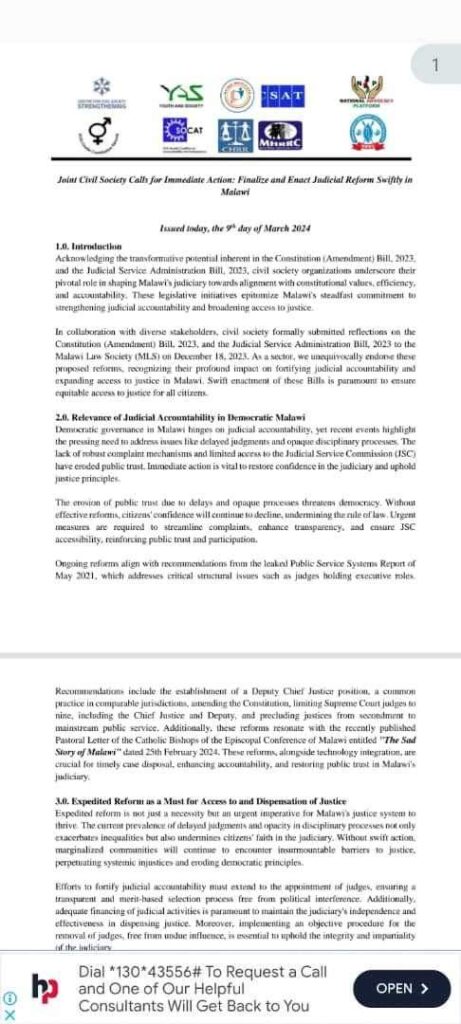Issued today, the 9th day of March 2024
1.0. Introduction
Acknowledging the transformative potential inherent in the Constitution (Amendment) Bill, 2023, and the Judicial Service Administration Bill, 2023, civil society organizations underscore their pivotal role in shaping Malawi’s judiciary towards alignment with constitutional values, efficiency, and accountability. These legislative initiatives epitomize Malawi’s steadfast commitment to strengthening judicial accountability and broadening access to justice.

In collaboration with diverse stakeholders, civil society formally submitted reflections on the Constitution (Amendment) Bill, 2023, and the Judicial Service Administration Bill, 2023 to the Malawi Law Society (MLS) on December 18, 2023. As a sector, we unequivocally endorse these proposed reforms, recognizing their profound impact on fortifying judicial accountability and expanding access to justice in Malawi. Swift enactment of these Bills is paramount to ensure equitable access to justice for all citizens.
2.0. Relevance of Judicial Accountability in Democratic Malawi
Democratic governance in Malawi hinges on judicial accountability, yet recent events highlight the pressing need to address issues like delayed judgments and opaque disciplinary processes. The lack of robust complaint mechanisms and limited access to the Judicial Service Commission (JSC) have eroded public trust. Immediate action is vital to restore confidence in the judiciary and uphold justice principles.
The erosion of public trust due to delays and opaque processes threatens democracy. Without effective reforms, citizens’ confidence will continue to decline, undermining the rule of law. Urgent measures are required to streamline complaints, enhance transparency, and ensure JSC accessibility, reinforcing public trust and participation.
Ongoing reforms align with recommendations from the leaked Public Service Systems Report of May 2021, which addresses critical structural issues such as judges holding executive roles.
Recommendations include the establishment of a Deputy Chief Justice position, a common practice in comparable jurisdictions, amending the Constitution, limiting Supreme Court judges to nine, including the Chief Justice and Deputy, and precluding justices from secondment to mainstream public service.
Additionally, these reforms resonate with the recently published Pastoral Letter of the Catholic Bishops of the Episcopal Conference of Malawi entitled “The Sad Story of Malawi” dated 25th February 2024. These reforms, alongside technology integration, are crucial for timely case disposal, enhancing accountability, and restoring public trust in Malawi’s judiciary.
3.0. Expedited Reform as a Must for Access to and Dispensation of Justice
Expedited reform is not just a necessity but an urgent imperative for Malawi’s justice system to thrive. The current prevalence of delayed judgments and opacity in disciplinary processes not only exacerbates inequalities but also undermines citizens’ faith in the judiciary. Without swift action, marginalized communities will continue to encounter insurmountable barriers to justice, perpetuating systemic injustices and eroding democratic principles.
Efforts to fortify judicial accountability must extend to the appointment of judges, ensuring a transparent and merit-based selection process free from political interference. Additionally, adequate financing of judicial activities is paramount to maintain the judiciary’s independence and effectiveness in dispensing justice. Moreover, implementing an objective procedure for the removal of judges, free from undue influence, is essential to uphold the integrity and impartiality of the judiciary.
While steps to depoliticize removal proceedings and enhance oversight mechanisms are commendable, they must be complemented with robust implementation and continuous monitoring to ensure effectiveness. Furthermore, financial autonomy and diversity within the judiciary are indispensable for promoting equitable access to justice and restoring public confidence in its impartiality and integrity.
4.0. Recommendations
Civil society urgently calls for the government to expedite the legislative process to ensure the prompt enactment of the proposed Bills, thereby guaranteeing equitable access to justice for all citizens of Malawi. It is in the interest of Malawians to have the proposed reforms enacted by the next sitting of Parliament.
We emphasize the critical role of cooperation by the judiciary in facilitating the swift finalization of the Bills for tabling in the August House during the next sitting of Parliament, underscoring the judiciary’s commitment to accountability and the rule of law.
Civil society urges citizens to actively engage with the Bills, advocating for their passage as essential safeguards of democracy and good governance in Malawi.
5.0. Conclusion
In conclusion, the Joint Civil Society emphasizes the imperative of expediting the finalization and enactment of the proposed judicial reforms. These reforms are indispensable for upholding the rule of law, promoting democratic principles, and ensuring equal access to justice for all Malawians.
Signed on this 9th day of March, 2024 by
Benedicto Kondowe
NAP CHAIRPERSON
On behalf of:
1. National Advocacy Platform (NAP)
2. Human Rights Defenders Coalition (HRDC)
3. Youth and Society (YAS)
4. Centre for Social Accountability and Transparency (CSAT)
5. National Alliance Against Corruption (NAAC)
6. Centre for Human Rights and Rehabilitation (CHRR)
7. Centre for Civil Society Strengthening (CSS)
8. Civil Society Coalition on Accountability and Transparency (CSCAT)
9. Malawi Human Rights Resource Centre (MHRRC)
10. Nyika Institute
11. NGO Gender Coordination Network (NGO GCN)
12. Human Rights Consultative Committee (HRCC)
13. Citizen Alliance
14. Malawi Economic Justice Network (MEJN)
15. NGO Coalition on Child Rights (NGO CCR)
16. Malawi Health Equity Network (MHEN)
17. Inua Advocacy (IA)
18. Church and Society, Linvingstonia Synod of Central Africa Presbyterian
19. Centre for Human Rights Education Advice and Assistance (CHREAA)
20. Centre for Democracy and Economic Development Initiatives (CDEDI)


